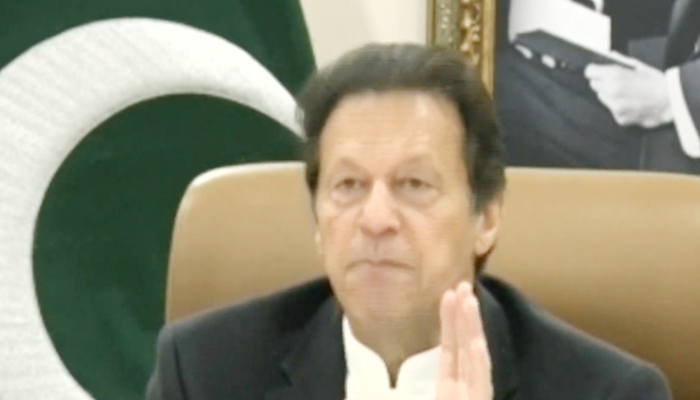Pakistan's current account recorded surplus after 17 years: PM Imran Khan in WEF address
PM Imran Khan talks about Pakistan's COVID policy, Afghan peace talks, and Indo-Pak relations in WEF address
November 25, 2020

ISLAMABAD: In his address on Wednesday to the World Economic Forum's (WEF) Country Strategy Dialogue (CSD) on Pakistan, Prime Minister Imran Khan said that the country's current account recorded a surplus after 17 years.
The CSD on Pakistan was held in recognition of the country’s positive economic trajectory and its commendable resilience amid the myriad challenges faced during the coronavirus outbreak.
The prime minister said that the country opened the construction sector, and because the work done there was in the open air, the virus did not spread.
The premier, talking about the Ehsaaas Programme, said that 15 million families were given cash handouts — and it really saved Pakistan from the worst effects of lockdowns.
"Because the people [cooperated] with us, they complied with our measures we came out of it better than any other country," the premier said, adding: "We saved our economy and we save people from dying from the virus."
However, the premier said that he was "worried" as the second peak had hit Pakistan, and the people were not taking it seriously. "We don't know how long will this wave last."
"In our country with high levels of poverty, we cannot afford to [impose] a lockdown where we [close] our businesses and factories," he said, adding that the country had taken a policy decision to only prohibit public gatherings — which he termed "non-essential stuff".
Economic challenges
Speaking about the two "biggest" challenges that his government faced when they came into power, he said: "The fiscal deficit — the biggest in our country's history — and the current account deficit that was also a challenge."
The prime minister said that when his government came into power, for a year and a half, they brought down the deficits and introduced policies to boost the economy.
Speaking about money laundering, he said that his government had clamped down on launderers, and as a result, after 17 years, Pakistan had a current account surplus in the last quarter.
"This affected our currency, and it is now gaining. Our exports are improving [...] as we give incentives to the industry in general," he said.
"Among the countries hit by COVID, Pakistan is fortunate," the prime minister said, adding: "After attaining stability, we are now moving in the right direction."
Speaking about the smart lockdown, he said that along with the lockdown, Pakistan also protected the daily wage earners.
The prime minister also informed the forum about the China-Pakistan Economic Corridor and said that the country needed skilled labour for the project.
Talking about the automobile industry, he said that Pakistan would welcome investment in the sector. "Pakistan wants investors to have facilities and benefits here."
"Small businesses' development is Pakistan's top priority," PM Imran Khan added.
Foreign ties
Shedding light on Indo-Pak ties, PM Imran Khan said that Pakistan had persisting problems with India. "Hopefully, with proper leadership in India, relations will return to normal."
Reiterating that Pakistan was a major player in the US-Taliban talks, the premier noted that the two parties had agreed to discuss issues on a table through the assistance of Islamabad.
The prime minister said that he aspired to see peace prevail in Afghanistan as a result of the US-Taliban peace talks that took place after years of bloodshed.
"Peace in Afghanistan will benefit surrounding areas," he said.
"President Trump has done well in Afghanistan, PM Imran Khan said, adding: Hopefully, [President-elect Joe] Biden will not back down from [the] good steps in Afghanistan."
Other WEF engagements
The prime minister will also participate in an interactive dialogue with WEF President Børge Brende, and chairpersons and chief executive officers (CEOs) of leading global corporations and WEF partner companies, read a statement from the Foreign Office.
Read more: Higher implementation of WTO's TFA 'adding value to Pakistan's economy', says Shaikh
Subsequent sessions of the day-long CSD will feature discussions of global business leaders with Adviser on Finance Dr Abdul Hafeez Sheikh, Minister for Economic Affairs Makhdoom Khusro Bakhtiar, and Minister for Industries and Production Hammad Azhar, on wide-ranging subjects, including economy, finance, investment, trade, manufacturing, digitalization and startups, regional connectivity and China Pakistan Economic Corridor (CPEC) etc.
The last segment will include a roundtable on “Energy Transition Priorities and Challenges in Pakistan”, co-led by Energy Minister Omar Ayub, Climate Change Advisor Malik Amin Aslam, and Special Assistant to the PM on Petroleum Nadeem Babar.
Moderated individually by the WEF president, managing director and other senior officials, each session of the CSD will enable CEOs of global corporations and multinational companies to interact directly with Pakistan’s top leadership on the vast business and investment opportunities available in the country due to the various initiatives for economic reforms by the incumbent government.
Read more: Is Pakistan doing enough to attract foreign investments?
The CSD is the WEF’s signature platform for countries with rising economies and promising growth potential.
The CSD was the second such event organized by the WEF for Pakistan this year. The CSD during PM Imran Khan’s visit to Davos, Switzerland, for the WEF Annual Meeting in January 2020 was widely attended by the global corporate sector.











